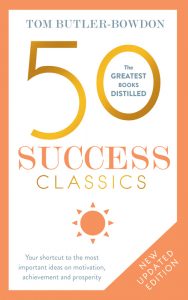
There is no shortage of reading lists to help readers fill the time and attempt to make some sense of the Coronavirus era. We’re in need of perspective, with information that will broaden our thinking and sharpen our point of view. Besides new writing, we require wisdom from hundreds or even thousands of years ago. Sometimes, for reasons of time and otherwise, we need that information in relatively brief, concise formats.
There is great value in someone who helps readers get to the point, enabling us to branch off from there if desired, as demonstrated in Tom Butler-Bowdon’s 50 Classics series of books. I’ve written about Tom often, first for USA TODAY and later for my blog, including the 2010 Q&A “300 Words With Tom Butler-Bowdon.”
He drills down to the essence of important books and authors, as I described in my post on 50 Economics Classics: “The format here echoes that of his earlier books (such as on Success, Psychology, Self-Help, Spirituality and others), and it remains ultra-informative: books are described in six or seven pages, with a lead-off quote, an “In a Nutshell” explanation, similar titles, and brief biographical material on the authors. The material is lucidly explained, placed in context and shown why it is important and worth reading.”
In writing about 50 Business Classics, I noted that he is “a curator extraordinaire, and unerringly determines the appropriate books to cover, which is far from an easy task.” The series covers nine topics of current and everlasting importance:
50 Psychology Classics (2nd edition)
50 Self-Help Classics (2nd edition)
50 Spiritual Classics (2nd edition)
50 Success Classics (2nd edition)
Taken together, the books can provide solace, inspiration, and guidance in times that often feel scary and unprecedented. The titles above include links to the full-text of Tom’s essays about some of the featured books. Examples include Peter Drucker’s Innovation and Entrepreneurship and The Essays of Warren Buffett (both in 50 Prosperity Classics), Jim Collins’ Good to Great and Catherine Ponder’s The Dynamic Laws of Prosperity (both in 50 Success Classics), Stephen Covey’s The 7 Habits of Highly Effective People and Louise Hay’s You Can Heal Your Life (both in 50 Self-Help Classics), Plato’s The Republic (50 Philosophy Classics), Carl Jung’s The Archetypes and the Collective Unconscious (50 Psychology Classics), and Aldous Huxley’s The Doors of Perception (50 Spiritual Classics).
The current era’s mixture of maximum uncertainty, interrupted careers. and lost jobs provides more reasons to read widely, in a variety of sources. In an interview with Tom for my 2013 book, Create Your Future the Peter Drucker Way, he remarked that the “greatest differentiator in terms of personal success is to have a different sense of time from your peers. If you have a long-term view, you will be more willing to build something that takes decades, instead of going after a short-term result.” This relates to a central message of his 2012 book Never Too Late to be Great: The Power of Thinking Long: regardless of your age or present work circumstances, there is comfort in knowing that many well-known, highly successful people took years before reaching their potential, in numerous areas of endeavor.
Recently Tom wrote an excellent post on LinkedIn, “What can I read right now for maximum enlightenment?” It points out the need for balance and perspective in reading, and how, while not neglecting new books, the classics (however defined) can be exactly what we need at the present moment.
